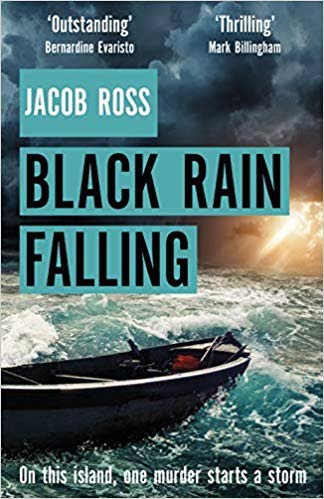Depth and drama in Ross’s Grenadian crime fiction

By John Robert Lee
Caribbean fiction has been expanding its genres in all directions for several years: magical realism to sci-fi or speculative fiction, contemporary historical fiction to the complexities of relationships in today’s world, novels and stories experimenting with form, freer in the use of “nation language,” young adult and children’s literature.
Many of our writers of prose, poetry and non-fiction have been recognised with prestigious international awards. If our literature was ever seen as a provincial, kind-of-exotic enterprise, even with the achievements of many older literary figures, this is not so any more. Our authors and their works are household names across the arts and literature world today. Young talents are always appearing to take their place alongside the more established.
Some of the earliest pioneers of crime fiction and mystery thrillers, who included Edgar Mittelholzer and John Morris (pseudonym of John Hearne and Morris Cargill), now find a worthy successor in Grenadian writer Jacob Ross.
His new novel, Black Rain Falling (Sphere, 2020) is second in a proposed Camaho Quartet. The first was The Bone Readers (2016) which won the inaugural Jhalak Prize in 2017. Camaho is a variant of the Kalinago name of Grenada, Camerhogne.
His Pynter Bender (2008) is a genuine Caribbean coming-of-age classic, which I would put alongside Lamming’s In the Castle of My Skin and other such notable and long-lived works. In 2017, Peepal Tree published his Tell No-One About This: Collected Short Stories 1975-2017.
These earlier books and the two novels of the Camaho Quartet share much in common: the setting of Grenada/Camaho, its flora, fauna, landscape and seascape, rural communities, young people finding their way to adulthood, older women whose strength is in their traditional knowledge and practices and a shrewd intelligence, who are the gatekeepers of family and villages; a certain resistance and resilience seen not only in these matriarchs, but also in the younger Michael “Digger” Digson, his police partner Miss Stanislaus, and their mentor, DS Chilman.

Their personal traumas are an integral part of the psychological depth of the unfolding dramas. Also in focus are the challenges of modern Caribbean life posed by police and political corruption, the cocaine trade, American influence and loss of traditional values.
As with the other books there are love interests, all traced with a kind of side-glanced, distanced, watchful look through the personalities circling each other.
Jacob Ross’s characters are clearly Caribbean in language which is as marked as his finely observed details of land, sea, food, dress. He has researched the technicalities of weapons used by the police as he has also described closely the forensic science of Digson, a forensics expert.
One of the attention-holding features of Ross’s writing is how well he has captured the atmosphere of his environments and how he uncovers the emotional lives of his actors. He has skilfully, in an understated way, without obvious literary devices, produced a driving story, that holds the reader.
Bernardine Evaristo, Booker Prize winner and long an admirer of this writer’s work, has rightly described The Bone Readers as containing “brilliant visual descriptions, dialogue that trips off the tongue, and keenly observed behaviour.”
The best crime fiction demands a subtly heightened conflict and suspense, a tight timeframe, a certain amount of foreshadowing through mood and other devices, strong characters that can hold our interest, believable plots. Common to the genre are love motifs, money interests, danger and death, vengeance, retribution, family involvements, police corruption, mystery. This popular literature is also enhanced by probings of human actions.
Ross’s novel has all these, finely drawn and woven together. The enigmatic relationship between Digson and Miss Stanislaus is a moving undercurrent of a love story and we wait to see what will unfold eventually with them as the cycle of novels proceeds.
Malan, the adversary of both is developing into someone complex, carrying old hurt. Miss Stanislaus’ father DS Chilman is a shrewd, smart, aging policeman who has invested in the team around him in an unorthodox, anti-establishment way.
Digson himself is a fascinating study of a loner with a troubled family background, who learned to wield a belt in a deadly way from his grandmother. He would be a Shogun-type superhero if the proposed movie based on these novels gets made.
Jacob Ross is emerging as one of our best novelists, charting a different route for himself in our wide literary neighbourhoods. His fiction is unique.
These crime-fiction explorations of the Camaho Quartet could be a best-seller in the Caribbean if the kind of promotion and marketing needed could be managed. Among older generations of Caribbean readers, the works of Agatha Christie, Leslie Charteris, Raymond Chandler and other similar authors and their unorthodox detective heroes had long been popular. I am confident that our youthful and older readers will respond enthusiastically to these thrillers by one of our own, set in familiar island surroundings with recognisable people and language.
Absorbing, page-turning, with depth of analysis and narrative, great storytelling, spicy – all the elements to gain an enthusiastic popular readership are there in Black Rain Falling.
John Robert Lee is a St Lucian writer. His latest book is Pierrot (Peepal Tree, 2020)

Comments
"Depth and drama in Ross’s Grenadian crime fiction"